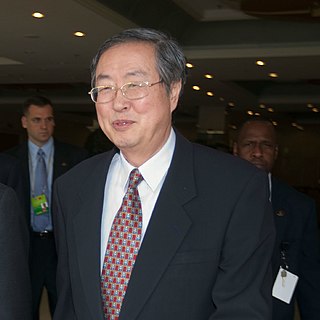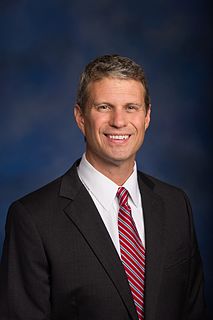
The Bank for International Settlements (BIS) is an international financial institution owned by central banks which "fosters international monetary and financial cooperation and serves as a bank for central banks". The BIS carries out its work through its meetings, programmes and through the Basel Process – hosting international groups pursuing global financial stability and facilitating their interaction. It also provides banking services, but only to central banks and other international organizations. It is based in Basel, Switzerland, with representative offices in Hong Kong and Mexico City.

The People's Bank of China is the central bank of the People's Republic of China responsible for carrying out monetary policy and regulation of financial institutions in mainland China, as determined by People's Bank Law and Commercial Bank Law. Valued at US$3.21 trillion, The People's Bank of China has had the largest financial asset holdings of any central bank in the world since July 2017. Though possessing a high degree of independence by Chinese standards, it remains a cabinet-level executive department of the State Council.

The Department of the Treasury (USDT) is an executive department and the treasury of the United States federal government. Established by an Act of Congress in 1789 to manage government revenue, the Treasury prints all paper currency and mints all coins in circulation through the Bureau of Engraving and Printing and the United States Mint, respectively; collects all federal taxes through the Internal Revenue Service; manages U.S. government debt instruments; licenses and supervises banks and thrift institutions; and advises the legislative and executive branches on matters of fiscal policy.

Currency substitution or dollarization is the use of a foreign currency in parallel to or instead of the domestic currency.
The global financial system is the worldwide framework of legal agreements, institutions, and both formal and informal economic actors that together facilitate international flows of financial capital for purposes of investment and trade financing. Since emerging in the late 19th century during the first modern wave of economic globalization, its evolution is marked by the establishment of central banks, multilateral treaties, and intergovernmental organizations aimed at improving the transparency, regulation, and effectiveness of international markets. In the late 1800s, world migration and communication technology facilitated unprecedented growth in international trade and investment. At the onset of World War I, trade contracted as foreign exchange markets became paralyzed by money market illiquidity. Countries sought to defend against external shocks with protectionist policies and trade virtually halted by 1933, worsening the effects of the global Great Depression until a series of reciprocal trade agreements slowly reduced tariffs worldwide. Efforts to revamp the international monetary system after World War II improved exchange rate stability, fostering record growth in global finance.

Monetary policy is the policy adopted by the monetary authority of a country that controls either the interest rate payable on very short-term borrowing or the money supply, often targeting inflation or the interest rate to ensure price stability and general trust in the currency.
Foreign exchange reserves are cash and other reserve assets held by a central bank or other monetary authority that are primarily available to balance payments of the country, influence the foreign exchange rate of its currency, and to maintain confidence in financial markets. Reserves are held in one or more reserve currencies, nowadays mostly the United States dollar and to a lesser extent the euro.

Zhou Xiaochuan is a Chinese economist, banker, reformist and bureaucrat. Zhou was best known for his term as the Governor of the People's Bank of China, a position in which he served from 2002 to 2018. He was longest-serving central bank chief since the establishment of the People's Republic of China, steering the monetary policy of an economy amid structural transformation.
International economics is concerned with the effects upon economic activity from international differences in productive resources and consumer preferences and the international institutions that affect them. It seeks to explain the patterns and consequences of transactions and interactions between the inhabitants of different countries, including trade, investment and transaction.
The Intergovernmental Group of Twenty-Four on International Monetary Affairs and Development, or The Group of 24 (G-24) was established in 1971 as a chapter of the Group of 77 in order to help coordinate the positions of developing countries on international monetary and development finance issues, as well as and to ensure that their interests are adequately represented in negotiations on international monetary matters. Though originally named after the number of founding Member States, it now has 28 Members. Although the G-24 officially has 28 member countries, any member of the G-77 can join discussions.
The Senate Banking Subcommittee on Economic Policy is one of five subcommittees within the Senate Committee on Banking, Housing, and Urban Affairs.
The Senate Banking Subcommittee on National Security and International Trade and Finance is one of five subcommittees within the Senate Committee on Banking, Housing, and Urban Affairs.
The Senate Foreign Relations Subcommittee on International Development, Multilateral Institutions and International Economic, Energy and Environmental Policy is one of seven subcommittees of the Senate Foreign Relations Committee.

The Central Bank of the United Arab Emirates is the state institution responsible for managing the currency, monetary policy and banking regulation in the United Arab Emirates (UAE).
The U.S. House Financial Services Subcommittee on Domestic Monetary Policy and Technology is a subcommittee of the House Committee on Financial Services. The committee was formerly part of the Subcommittee on Domestic and International Monetary Policy, Trade, and Technology until the 111th Congress, when a separate Subcommittee on International Monetary Policy and Trade was created.
The United States House Financial Services Subcommittee on National Security, International Development and Monetary Policy is a subcommittee of the House Committee on Financial Services. It was formerly part of the Subcommittee on Domestic and International Monetary Policy, Trade, and Technology until the 111th Congress, when a separate Subcommittee on Domestic Monetary Policy and Technology was created. In the 113th Congress, the two subcommittees' jurisdictions were again merged.

William Patrick Huizenga is an American politician serving as the U.S. Representative for Michigan's 2nd congressional district since 2011. A member of the Republican Party, he previously served in the Michigan House of Representatives from 2003 to 2009.

Frank Dean Lucas is an American politician serving as the U.S. Representative for Oklahoma's 3rd congressional district, since 2003, having previously represented the 6th district, from 1994 to 2003. He is a member of the Republican Party and serves as the ranking minority member of the House Committee on Science, Space and Technology. His district, numbered as the 6th district from 1994 to 2003, is the largest congressional district in the state and one of the largest in the nation that does not cover an entire state. It covers 34,088.49 square miles and stretches from the Panhandle to the fringes of the Tulsa suburbs, covering almost half of the state's land mass.

Geoffrey William Seiji Okamoto is an American economist and government official who currently serves as the Acting Assistant Secretary for International Finance and Development in the United States Department of the Treasury. He was nominated for this position on January 1, 2019, by the White House and has not been confirmed by the United States Congress. He previously served as Acting Assistant Secretary for International Markets and Investment.
Graciela Kaminsky is a Professor of Economics and International Affairs at George Washington University and a Faculty Research Associate at the National Bureau of Economic Research. Kaminsky studied Economics at the Massachusetts Institute of Technology where she received her Ph.D. In 1984 she did a brief research stay at the Argentine Central Bank, later in 1985 she moved to San Diego as an assistant professor at the University of California. In 1992 she worked on the Board of Governors of the US Federal Reserve System, later in 1998 she was appointed a full professor at George Washington University where she works at the Elliot School of International Affairs. Kaminsky has been a visiting scholar at the Bank of Japan, the Bank of Spain, the Federal Reserve Bank of New York, the Hong Kong Monetary Authority, and the Central Bank of France.









